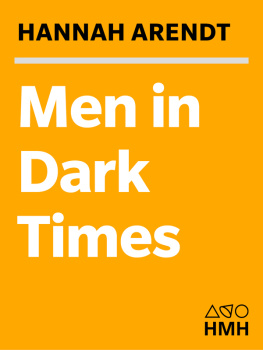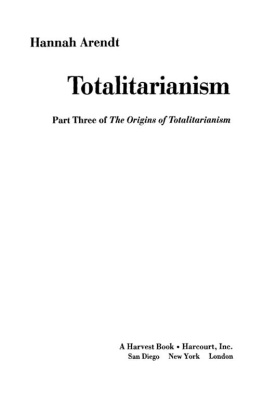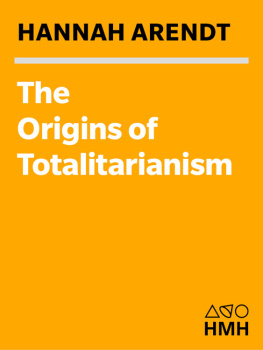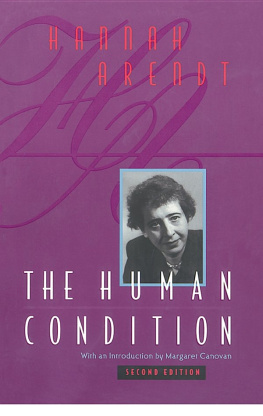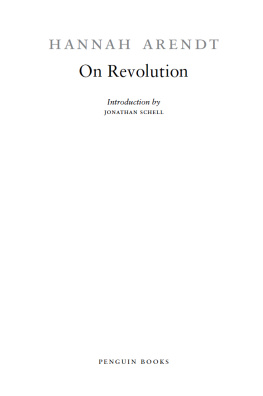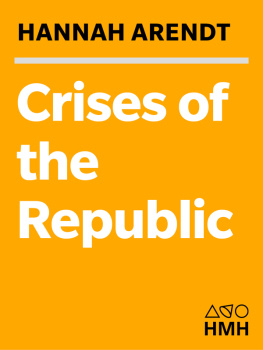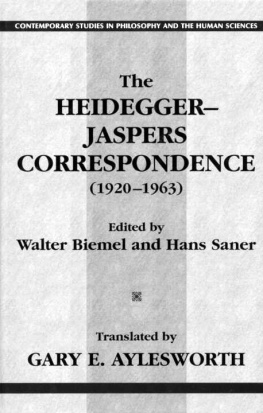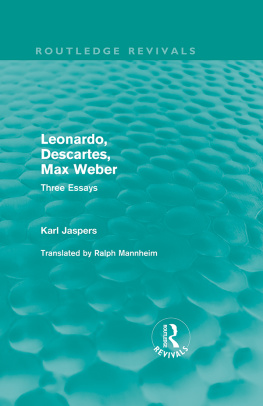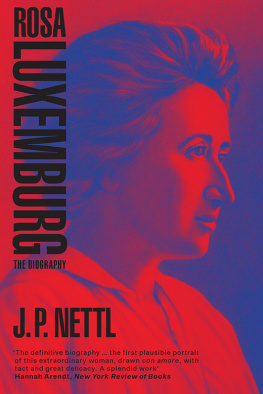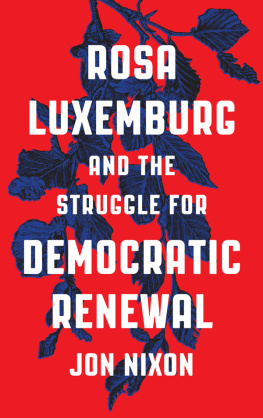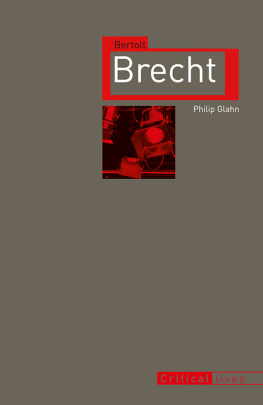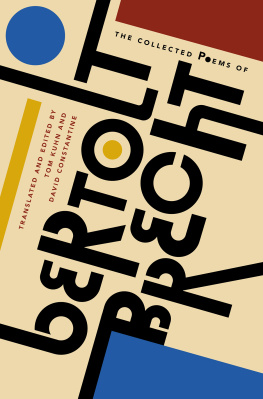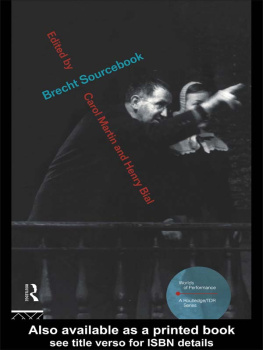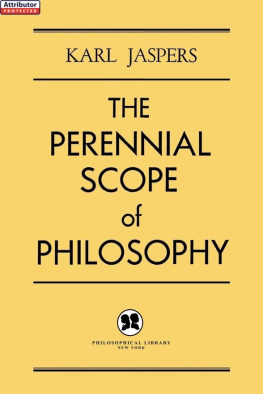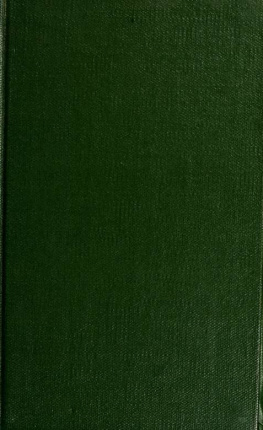Copyright 1968, 1967, 1966, 1965, 1955 by Hannah Arendt
Copyright renewed 1995, 1994, 1993 by Lotte Kohler
Copyright renewed 1983 by Mary McCarthy West
All rights reserved. No part of this publication may be reproduced or transmitted in any form or by any means, electronic or mechanical, including photocopy, recording, or any information storage and retrieval system, without permission in writing from the publisher.
For information about permission to reproduce selections from this book, write to Permissions, Houghton Mifflin Harcourt Publishing Company, 215 Park Avenue South, New York, New York 10003.
www.hmhbooks.com
Library of Congress Catalog Card Number: 68-24381
ISBN 0-15-658890-0
eISBN 978-0-547-54205-8
v2.0513
Acknowledgments appear on , which constitutes a continuation of the copyright page.
Preface
W RITTEN over a period of twelve years on the spur of occasion or opportunity, this collection of essays and articles is primarily concerned with personshow they lived their lives, how they moved in the world, and how they were affected by historical time. The people assembled here could hardly be more unlike each other, and it is not difficult to imagine how they might have protested, had they been given a voice in the matter, against being gathered into a common room, as it were. For they have in common neither gifts nor convictions, neither profession nor milieu; with one exception, they hardly knew of each other. But they were contemporaries, though belonging to different generationsexcept, of course, for Lessing, who, however, in the introductory essay is treated as though he were a contemporary. Thus they share with each other the age in which their life span fell, the world during the first half of the twentieth century with its political catastrophes, its moral disasters, and its astonishing development of the arts and sciences. And while this age killed some of them and determined the life and work of others, there are a few who were hardly affected and none who could be said to be conditioned by it. Those who are on the lookout for representatives of an era, for mouthpieces of theZeitgeist, for exponents of History (spelled with a capital H) will look here in vain.
Still, the historical time, the dark times mentioned in the title, is, I think, visible everywhere in this book. I borrow the term from Brechts famous poem To Posterity, which mentions the disorder and the hunger, the massacres and the slaughterers, the outrage over injustice and the despair when there was only wrong and no outrage, the legitimate hatred that makes you ugly nevertheless, the well-founded wrath that makes the voice grow hoarse. All this was real enough as it took place in public; there was nothing secret or mysterious about it. And still, it was by no means visible to all, nor was it at all easy to perceive it; for, until the very moment when catastrophe overtook everything and everybody, it was covered up not by realities but by the highly efficient talk and double-talk of nearly all official representatives who, without interruption and in many ingenious variations, explained away unpleasant facts and justified concerns. When we think of dark times and of people living and moving in them, we have to take this camouflage, emanating from and spread by the establishmentor the system, as it was then calledalso into account. If it is the function of the public realm to throw light on the affairs of men by providing a space of appearances in which they can show in deed and word, for better and worse, who they are and what they can do, then darkness has come when this light is extinguished by credibility gaps and invisible government, by speech that does not disclose what is but sweeps it under the carpet, by exhortations, moral and otherwise, that, under the pretext of upholding old truths, degrade all truth to meaningless triviality.
Nothing of this is new. These are the conditions which, thirty years ago, were described by Sartre in La Nause (which I think is still his best book) in terms of bad faith and resprit desrieux, a world in which everybody who is publicly recognized belongs among the salauds, and everything that is exists in an opaque, meaningless thereness which spreads obfuscation and causes disgust. And these are the same conditions which, forty years ago (though for altogether different purposes), Heidegger described with uncanny precision in those paragraphs of Being and Time that deal with the they, their mere talk, and, generally, with everything that, unhidden and unprotected by the privacy of the self, appears in public. In his description of human existence, everything that is real or authentic is assaulted by the overwhelming power of mere talk that irresistibly arises out of the public realm, determining every aspect of everyday existence, anticipating and annihilating the sense or the nonsense of everything the future may bring. There Is no escape, according to Heidegger, from the incomprehensible triviality of this common everyday world except by withdrawal from it into that solitude which philosophers slnoe Parmenides and Plato have opposed to the political realm. We are here not concerned with the philosophical relevance of Heideggers analyses (which, in my opinion, is undeniable) nor with the tradition of philosophic thought that stands behind them, but exclusively with certain underlying experiences of the time and their conceptual description. In our context, the point is that the sarcastic, perverse-sounding statement, Das Licht der ffentlichkeit verdunkelt alles (The light of the public obscures everything), went to the very heart of the matter and actually was no more than the most succinct summing-up of existing conditions.
Dark times, in the broader sense I propose here, are as such not identical with the monstrosities of this century which indeed are of a horrible novelty. Dark times, in contrast, are not only not new, they are no rarity in history, although they were perhaps unknown in American history, which otherwise has its fair share, past and present, of crime and disaster. That even in the darkest of times we have the right to expect some illumination, and that such illumination may well come less from theories and concepts than from the uncertain, flickering, and often weak light that some men and women, in their lives and their works, will kindle under almost all circumstances and shed over the time span that was given them on earththis conviction is the inarticulate background against which these profiles were drawn. Eyes so used to darkness as ours will hardly be able to tell whether their light was the light of a candle or that of a blazing sun. But such objective evaluation seems to me a matter of secondary importance which can be safely left to posterity.
January 1968
I
T HE distinction conferred by a free city, and a prize that bears the name of Lessing, are a great honor. I admit that I do not know how I have come to receive it, and also that it has not been altogether easy for me to come to terms with it. In saying this I can ignore entirely the delicate question of merit. In this very respect an honor gives us a forcible lesson in modesty; for it implies that it is not for us to judge our own merits as we judge the merits and accomplishments of others. In awards, the world speaks out, and if we accept the award and express our gratitude for it, we can do so only by ignoring ourselves and acting entirely within the framework of our attitude toward the world, toward a world and public to which we owe the space into which we speak and in which we are heard.
But the honor not only reminds us emphatically of the gratitude we owe the world; it also, to a very high degree, obligates us to it. Since we can always reject the honor, by accepting it we are not only strengthened in our position within the world but are accepting a kind of commitment to it. That a person appears in public at all, and that the public receives and confirms him, is by no means a matter to be taken for granted. Only the genius is driven by his very gifts into public life, and is exempted from any decision of this sort. In his case alone, honors only continue the concord with the world, sound an existing harmony in full publicity, which has arisen independently of all considerations and decisions, independently also of all obligations, as if it were a natural phenomenon erupting into human society. To this phenomenon we can in truth apply what Lessing once said about the man of genius in two of his finest lines of verse:
Next page
